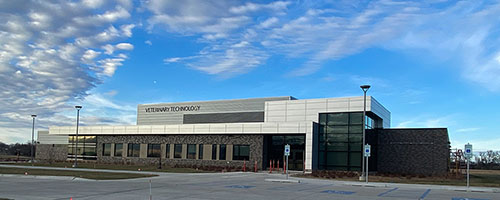NORFOLK, Neb. -- When Northeast Community College veterinary technology students moved into their new classroom and clinic building in January 2022, the plan was to expand the size and scope of the program.
Dr. Michael Cooper, director of the vet tech program, said that plan is now being realized.
The vet tech building was part of the Nexus project which raised more than $20 million for new agricultural facilities at Northeast. It is located on the east side of the Northeast campus near the Chuck Pohlman Ag Complex and provides much needed space for the vet tech program.
“The new building has space for students to observe and learn,” Cooper said, “space for treatment and housing of animals, and space for expansion of the program.”
A USDA-NIFA (National Institute of Food and Agriculture) grant allowed Northeast to hire a vet tech instructor with a focus on large animal care, and Cooper said that was the other component needed for the high-demand program to expand.
Annastasia McCracken, a licensed veterinary technician, joined Cooper, Dr. Cassie Wessendorf and Josh Schlote on the Northeast vet tech faculty.
Before 2022, vet tech classes had always been capped at 24 students, Cooper explained, but by the time faculty determined which students were qualified, class size was usually 20 or fewer students. With a faculty of three, there was not much room for growth.
“With the addition of Anna, we were able to go up to 32 students,” Cooper said. “Last year we took 27 students and this year, 28 students were accepted into the Northeast vet tech program.
“We’re getting quality students,” Cooper said, “and we’re just doing a ton of student visits yet. Students are coming to Northeast from all across Nebraska, from South Dakota, and we are getting some kids from Iowa and even some Kansas kids are coming up and checking us out.”
In addition to more students, Northeast is also now able to include more large animal care in the curriculum.
“Because of Anna being able to offer more one-on-one time with students,” Cooper said, “we’re finding that more kids like large animal work. We’re seeing a shift to more mixed animal practice for our students, which is good. There is a shortage of large animal veterinarians and vet techs.”
Each fall, Northeast hosts a Food Animal Camp for high school juniors and seniors to learn about careers in food animal production. Participants get hands-on experience with food animals and discover how to reach educational goals.
“That will continue to push our large animal component,” Cooper said.
Large animal care is not the only addition to the curriculum.
“Dr. Wessendorf is finishing up her certification in rehabilitation.” Cooper said, “and she is going to create some electives in that, not only for our students but also as continuing education for already licensed techs.”
Cooper said the new facility, with its focus on technology, is also being utilized by area veterinarians.
“We have our CT and we’ve been doing a lot of referrals for veterinarians who want some advanced imaging,” Cooper said. “Last spring, we had the only board-certified veterinary dentist in the state do a dental lab for practicing veterinarians. And last fall Zoetis wanted to do a training for newly licensed veterinarians on necropsies to ensure that the company received quality samples. Our students got to help with that.”
Cooper said there is still a lot of potential for growth in the program, depending on resources and how much four faculty members can handle.
“I think we are kind of at the point where we need to catch our breath a little bit,” he said, “and see what happens over the next year or two.”
###

